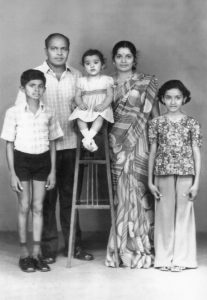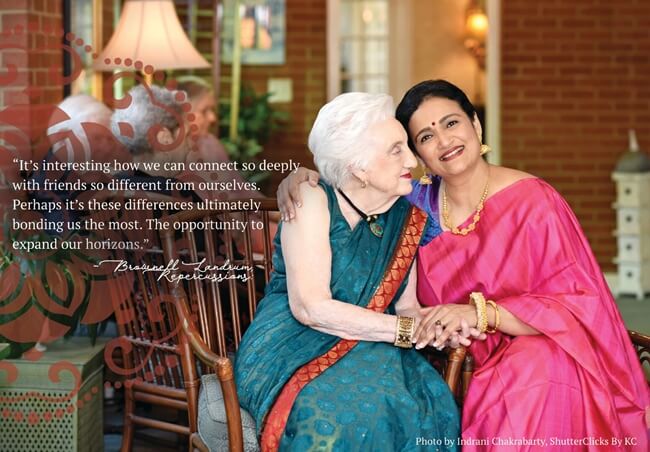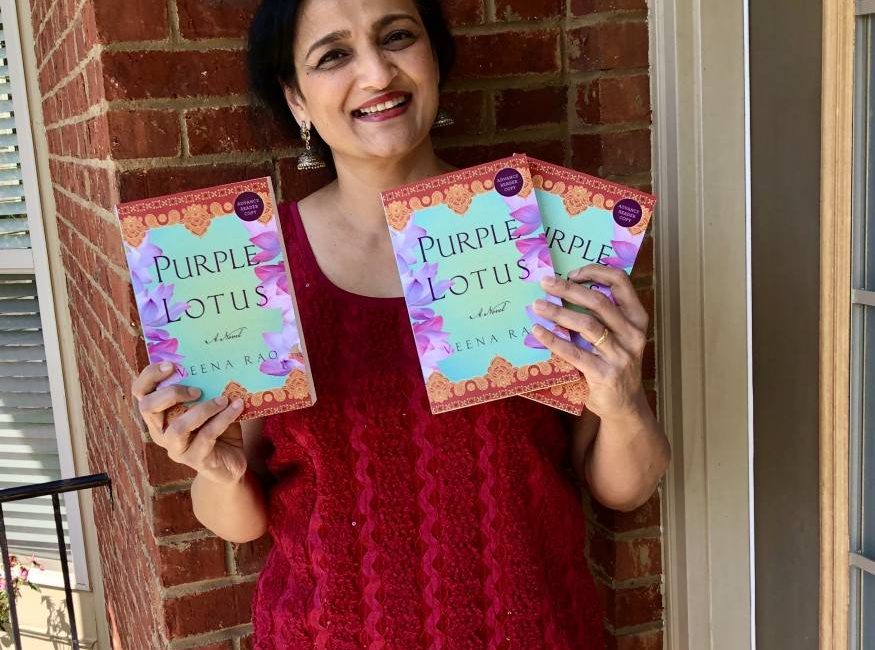Several women across the globe lose their identity to patriarchy. But there are a few who find a ground to be heard equally through tenacious and almost heroic resistance. The founder, publisher, and editor-in-chief of NRI Pulse, Veena Rao, is one of them. In a tell-all to Saris to Suits ®, she speaks about her life, struggles, and discovering her true self.

7-year-old Veena with her family after moving to Mangalore from Orissa
(Atlanta, GA, July 16, 2021) Sexism and patriarchy are deep-rooted within the social fabric of real, grassroots India. For centuries, women have found themselves in a quandary of whether to rebel or reconcile. Atlanta-based author Veena Rao’s life in India was no different. When her family moved to a small, conservative coastal town, Mangalore, she dealt with a similar conflict. While most family members had blended well within the patriarchal setup, Veena’s non-conformist spirit felt trapped and suffocated. She quickly rejected her hometown, its culture, cuisine, people and withdrew into a shell. “My mother wasn’t prepared for the move, and I think her anxiety rubbed off on me. I feared expressing myself, breaking the rules, raising my voice. Soon concepts like ‘freedom’ and ‘individuality’ became alien to me, and most of my childhood and adolescence spent in silence,” shares Rao.
Years later, Veena acquired a place in the prestigious Limca Book of Records for being the first Indian woman to edit and publish a newspaper outside India. Over the years, the brown, introverted girl had transformed her weaknesses into strengths, and self-flagellation no longer shadowed her moments of triumph. “I became a good listener and turned to writing as a way to express myself. It also acted as a medium for my invisible, unremarkable self to be seen and valued.”

Veena with her mother and son Aditya who’s now earning PhD at Cornell University
No transformation is an easy ride. In a bid to give her son, Aditya, who is now earning a Ph.D. at Cornell, a better life, Rao migrated to the US in 2001. Far away, she found a sense of relief that was both comforting and reconciling to her. In 2002, she got her work permit, and subsequently, in 2004, her green card, but it was the year 2006 that changed the course for her. “I woke up one morning and decided that I would launch a newspaper, NRI Pulse – with no business plan or capital, but just a deep belief that I could do it, and prior experience as a journalist. Sitting in my living room, it seemed like an easy thing to do, but it was not. I ran on a shoestring budget, did most of the work myself, and made personal sacrifices. And, they paid off! In 2010, I got featured in the Limca Book of Records. This recognition immediately raised the newspaper’s profile in the community and helped establish its brand name. This year NRI Pulse celebrates its 15th anniversary. The Atlanta based news publication is a success story and a leader in the Indian-American news market. We are proactive in community-building. Our primary purpose is to inform our readership of what’s happening in our communities, at the local, state, and national levels, promote civic engagement and be a voice at the policy-making tables,” reveals the 52-year-old.
America was welcoming and supportive to Rao in helping her take control of her life. This, unfortunately, is not every South Asian woman’s story who migrates to the US. There are studies suggesting violence, abuse, patriarchal belief systems haunting women even outside India. The Indian American agrees. “This is why I wrote Purple Lotus. Surviving domestic abuse and confronting patriarchal belief systems are the primary themes of my novel. My story is set in Atlanta and is inspired by the stories I’ve been reporting on and witnessing during the past two decades. It also serves a taste of my struggles to find myself here.”
The journalist who released her debut novel ‘Purple Lotus’ in September last year confesses to having learned a lot about herself in the past ten years while writing the manuscript. If you have had a chance to read her book, you would have noticed an uncanny resemblance between Veena and the protagonist, Tara. However, the novelist points out, “Tara’s story is not autobiographical, but deep diving into her thoughts and feelings helped me go deeper within myself and come to terms with my fears and shortfalls. Immersing myself in writing about her helped me understand and accept myself and others. It made me a more empathetic person. In the story, her character is complex and nuanced. She shows extraordinary grit when life demands it out of her. It’s the same for each one of us. We are all ordinary until we are extraordinary.”

In 2020, Veena was requested to be one of the role models for Saris to Suits ® calendar along with the founder of Ogbomosho School for the Blind in Nigeria, Frances M. West, 99. The novelist says getting involved with the calendar allowed her to learn more about the organization and its mission to support domestic and sexual abuse victims. She is equally pleased that Patti Tripathi chose to name the legal defense fund after her novel. “I hope the fund grows exponentially and helps transform the lives of women who are trapped in abusive situations.”

Veena Rao with her “Southern Mom” Frances West for SarisToSuits 2020 calendar of strong women who Pose for a Purpose
The award-winning writer is working on her next novel, set in a small town in Georgia. She has a bucket list of desires to fulfill and looks forward to living life unburdened.
(Manvi Pant is a staff writer for Saris to Suits ® Omniscient Perspective. After a corporate career spanning eight years, she has moved to academics and also runs her storytelling platform Real Life Heroes. Founded by former network news anchor Patti Tripathi, US-based Saris to Suits ® focuses on building awareness to break down the barriers that constrain the advancement of women and girls. We aim to advance women’s empowerment, education, gender inclusivity, equality and social justice. www.SarisToSuits.org)



